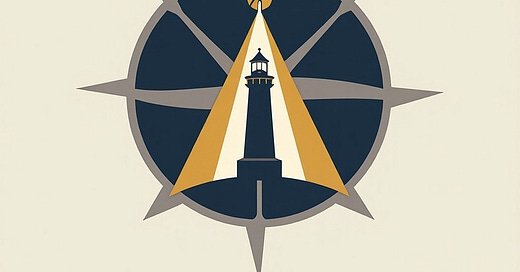Episode 3: The Habit of Dehumanization—and the Compass of Grace
Subtitle: The Declaration and Our Reflection
What do we do when our founding documents reflect both our highest hopes and our deepest hypocrisies?
Abraham Lincoln answered that question not by ignoring the contradiction—but by confronting it. When the nation’s wounds were raw, and the future uncertain, Lincoln didn’t reach for the Constitution to justify his case for unity and justice. He reached for something older: the Declaration of Independence.
🪞 A Mirror to the Nation
“All men are created equal.” Lincoln treated that phrase not as aspiration—but as indictment.
He knew we had failed to live up to those words. He knew slavery was not just a Southern sin—it was a national compromise. Yet he didn’t wield that failure to sow hate. He used it to demand honesty.
In speech after speech, and most powerfully in the Gettysburg Address, Lincoln framed the war not as a clash of armies—but as a test of moral character:
“Four score and seven years ago our fathers brought forth...a new nation, conceived in Liberty, and dedicated to the proposition that all men are created equal.”
He wasn’t just calling us to remember. He was challenging us to become.
Lincoln didn’t ask us to erase the past. He asked us to reckon with it.
That’s what makes his strategy so relevant now. In an era when moral clarity is often replaced by partisan slogans, Lincoln’s leadership reminds us:
You don’t need to hate your country to admit its failures. You need to love it enough to correct them.
📜 Reagan and the Missing Chapter
That’s why a small discovery this week stopped me cold.
I came across a PragerU video celebrating President Ronald Reagan. It praised his optimism, his economic policies, his Cold War strategy. It even called him the man who “redefined America.”
But something was missing.
There was no mention—none—of Reagan’s 1986 Immigration Reform and Control Act, a law that granted amnesty to nearly 3 million undocumented immigrants.
Reagan called it a “matter of decency.” He believed that if someone had worked, lived, and contributed to America, they deserved a chance. Not exile. Not shame. A chance.
And yet, this defining moment in his presidency was omitted.
📵 The Story We Tell—and the Story We Hide
This wasn’t just an editing choice. It was strategic omission. In today’s political climate, Reagan’s act of grace complicates the “strong border, no mercy” narrative. So it vanishes.
This is how the habit of dehumanization is preserved: not only by what’s said, but by what’s left out.
So we return to Lincoln.
Because Lincoln didn’t dodge hard truths. He stared them down. He didn’t simplify the past to control the future—he made the past speak to the future.
🧭 The Compass of Grace
We are again at a crossroads. The language of exclusion is rising. Truth is being replaced by marketing. History is being trimmed to fit the mood.
But grace still offers us a way forward.
It says: Yes, we have failed. But we are not the sum of our failures. We are the sum of what we choose next.
Lincoln didn’t call us to perfection. He called us to responsibility. So did Reagan, when he saw humanity over party.
“All men are created equal.”
That phrase still calls. Not as comfort. But as challenge.
This is us—if we choose to remember. If we possess the courage to choose grace.






Share this post